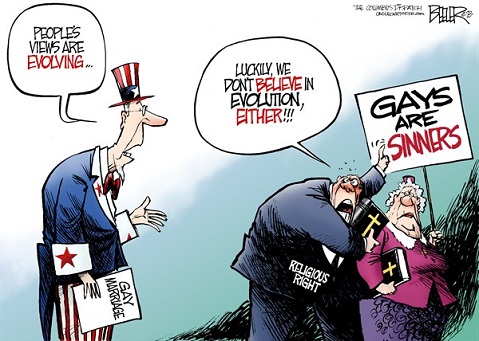Religion + Politics = Manipulation
Many Use The Word to Make Policy as The Man

For thousands of years, the oppressed have looked for deliverance. A Messiah imaged as a white man comes down from heaven, throws off the yoke of an evil oppressor, and brings freedom and justice to the masses.
Almost three years ago, I sat by the grave of a dear friend on a hazy breezy afternoon. He had been my partner and confidant for more then 30 years, and although we agreed on many things, we disagreed intensely in our politics, particularly in the election of 2008 when then-candidate Barack Obama was running for president. My friend saw Mr Obama as the antithesis to American life, and in one unusually harsh discussion, we heard the man who had been the best man at my wedding, ask, “Who do you think Obama is … the messiah?”
Many who walk the halls of Congress or inhabit the state houses around this country feel compelled to use religion as a weapon in their political arsenal. Those who profess faith as their moral compass whether it is a politician or a member of the clergy have manipulated this mythical figure Messiah as well as its anathema, the anti-Christ, as profound symbolism in the propaganda war they wage in America today. Religion in 21st-century America has become more than a belief system to bring meaning where there is seemingly senseless and tragic events and comfort for those who suffer from the ills of the body and spirit or their happenstance in life. Instead, it has coalesced a voting block in this country who will forgo science or even common sense in its hubris.
This group will use the Bible as its Braille to decipher questions concerning climate change and our environment or what can be taught about evolution in public schools. Further, under the guise of religious freedom, Republican members of state legislatures attempt to pass bills to promote discrimination against LGBTQ (lesbian, gay, bisexual, transsexual, queer or questioning) Americans.
The right wing has distilled its message to the point that many secular issues today are fermented and suddenly become a question of religious purity. And we have become all too familiar with this crusade by the current Republican majority in Congress and its minority counterpart in the Senate.
James Inhofe, senator from Oklahoma, continues to be a zealot climate change denier. Inhofe has been quoted as saying human influence in creating climate change is a hoax and impossible because “God’s still up there.” He believes it is “outrageous” and arrogant for people to believe human beings are “able to change what He is doing in the climate.” He juxtaposes this belief when advocating policy. A ranking member of the Senate Armed Services Committee, Inhofe said at a hearing on the Defense Department fiscal year 2015 budget that President Barack Obama has wasted $120 billion on global warming that would have been better spent on the military.
In Missouri, a state representative has launched yet another attack on science and evolution. Republican State Senator Rick Brattin has introduced a law that would allow parents to opt out of having their children taught about natural selection. Brattin, who has spent the better part of a year trying to get laws passed to limit the science curriculum, continues to maintain that evolution is just a theory.
And in Arizona, Republicans in the state legislature passed a law last month (opening the door for other states to copy, like Kansas) that would allow business owners to assert their religious beliefs in denying service to gay and lesbian customers. This sparked a fire storm from many groups, including corporations that believed the loss in revenue would be substantial. It wasn’t until the site of the next Super Bowl was in jeopardy that a reversal of the law became an option. Governor Jan Brewer did in fact veto the law, but sadly it was not because of a conscious of morality but rather regaining consciousness through the smelling salts of financial disaster.
The square root of why these politicians and others around the country can and will succeed in influencing their base in policy matters is their constituents’ belief that man is destined to falter and is unable to solve problems (even manmade problems), and that collectively our only hope is to be delivered by a messiah. And until such time when the messiah returns, religious dogma must be followed, even if it leads to preventable natural disaster, a backward approach to the beginning of life on this planet, or the egregious discrimination against those who are deemed different according to the Bible.
The Constitution guarantees religious freedom: the right to worship a god without government interference. But the framers also sought separation between church and state. Statesmen like Thomas Jefferson and James Madison, who lived in an age when religion was questioned in the face of scientific discovery, saw man as his own deliverer from the challenges of their day.
They were not waiting for a messiah and deciding to remain inactive until that day arrived. On the contrary, they were the proactive experimentalists of a democracy that would change the course of human history forever.



